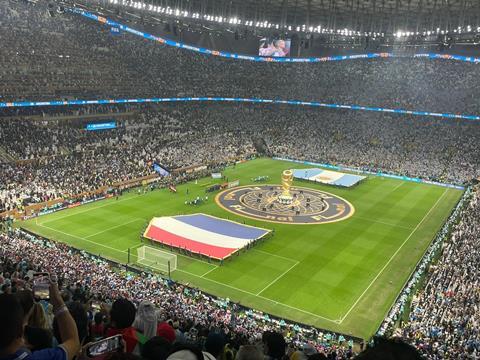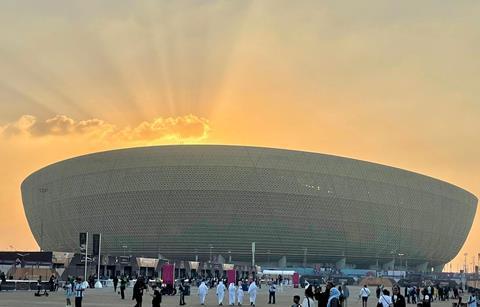Gleeds chairman enjoyed a thrilling World Cup final at the conclusion of a tournament that often challenged football’s world order

It all seemed a bit surreal as I sat in the Lusail Stadium, located about 15 kilometres (9.3 miles) north of Doha, watching last night’s World Cup final. I was joined by an estimated worldwide TV audience of over 1.5bn and, while the stadium capacity was 89,000, such was the noise from the elated Argentinia fans that it sounded like most of those global spectators were actually in the ground with me.
For aficionados this was one of the best final matches on record. The magic of Lionel Messi carried his team to victory and the majesty of Kylian Mbappe was also on full display, with the tension and excitement palpable throughout. Finals are often an anti-climax, but this one served up more than enough thrills and spills.
>> Also read: Part I and Part II and Part III of Richard Steer’s World Cup diary
The World Cup is literally the biggest show on Earth, bigger even than the Olympics said the man to my left, Sir Steve Redgrave. And he should know, being one of our most honoured and decorated Olympians – and also a Chelsea fan.
Sir Steve joined me to watch the game and closing ceremony and confided that, having been a participant in many spectacular opening ceremonies – some times as the flag carrier for Team GB – all the razzmatazz and theatre can be something of a distraction. As a competitor, your sole aim is to come, compete and win. The rest is window dressing. For us it is spectacle; for the participants, a job of work.

The stadium for the final has a British link and was designed by Foster + Partners and Populous, supported by MANICA Architecture. I am told it is cooled using solar power and is claimed to have a zero carbon footprint. I am sure it was working hard last nightm, but the evening was still hot and sultry.
At the end of the tournament I reflect that, while Qatar has been the smallest country to ever host the World Cup, even the most hardened critic would have to accept that as a nation they have done a consumate job. Clean streets, efficient and polite crowd marshals, effective transportation and with all the fans concentrated in a small geographic area – it has created a sublime carnival atmosphere.
The violence and partisanship that too often creates tension and friction at other tournaments has been completely absent here and, despite much criticism of human rights issues and allegedly corrupt practices, the tournament itself has been a triumph and the football truly magical.

My overall memories will be of stadiums that, while effective and functional, were not exactly awe-inspiring. They seemed a little antiseptic and sterile.
They looked great from the outside but a little utilitarian on closer inspection. To use footballing parlance, perhaps more Championship than Premier League?
The organisation, signage, delivery and management was however most professional and effective. Security was not oppressive and one never felt unsafe or insecure. Terrorism or hooliganism was simply not an issue in Qatar.
But my fondest memories of all are of the fans. Football obsessives from 32 countries intermingling, chanting, dancing, singing and genuinely enjoying the sport – and even commiserating with opposing fans when appropriate.

When the headlines about David Beckham are forgotten and the ranting of the bizarre and delusional Fifa president are consigned to the dustbin, it will be the football that is remembered as the real winner here. New and unexpected smaller teams like Japan, Morocco and of course Saudi Arabia took on and beat the leviathans of Germany and Spain (and Argentina in the group stages).
This World Cup will be recalled as the tournament when the minnows went toe to toe with the monoliths and won – an appropriate metaphor for Qatar being first awarded and then staging the World Cup itself and winning as a nation if not as a team against the odds.
More on the World Cup
>> Your guide to the World Cup 2022 stadiums
>> Designing for the desert: how British architects approached the 2022 World Cup




























No comments yet